|

|

|

|

|

|
|
For
some reason, I was unable to access my web site for quite some time. I don't know
what the issue was, but the folks at HostRocket have resolved it, and
now it is time to catch up on a few matters.
Sunday,
March 23, 2008
 Government
& Business
- As
part of my continuing participation as a "public member" of
the editorial board of the Arizona Daily Sun, we are encouraged to pen
individual weekly comments, based on the editorials the paper has run,
or the topics we have discussed, but which haven't yet been
editorialized upon. Here is the third, in an ongoing
series. I am grateful for the opportunity, so am trying to use
this soap box to preach a little free market economics. The
editorial ran on February 17. Government
& Business
- As
part of my continuing participation as a "public member" of
the editorial board of the Arizona Daily Sun, we are encouraged to pen
individual weekly comments, based on the editorials the paper has run,
or the topics we have discussed, but which haven't yet been
editorialized upon. Here is the third, in an ongoing
series. I am grateful for the opportunity, so am trying to use
this soap box to preach a little free market economics. The
editorial ran on February 17.
|
 Editorial
Board Sounding: Keep government out of economic
development Editorial
Board Sounding: Keep government out of economic
development
Not a week
goes by that we don’t hear about some new government program
that is going to improve our lives. I am usually
skeptical about these efforts. This week the county
board of supervisors expressed interest in increasing its
bureaucracy to include “economic development,” a course
which Flagstaff has also been pursuing. Aside from the
huge potential for waste and mismanagement, my question is,
“Why?” What is the rationale for using taxpayer
dollars to fund this kind of endeavor?
The usual
response is that these efforts will generate higher paying
jobs. But, why is that the role of our city and county
governments? Quite simply, it isn’t. Using
government for these kinds of purposes should raise some moral
and ethical red flags. Government has one unique
characteristic that distinguishes itself from the market –
we are coerced into complying with its decisions, and to pay
the taxes it assesses.
Using
government to improve the public good should be a difficult
task, since there is virtually no end to how many projects
that can be dreamt up, be it an auto mall, or a convention
center, or an economic development agency. Let those who
are most likely to benefit from these kinds of projects fund
and promote them. Indeed, it appears that the city’s
agenda in this regard is to attract only a particular type of
business to town, making the use of taxpayer money even more
indefensible.
Dennis
Foster has a Ph.D. in economics, teaches at the university
level and is an avid Grand Canyon hiker. |
The editorial that ran in the paper, on this topic, basically
complained about the county wanting to duplicate the city's efforts at
economic development. Yikes! There used to be a group
called GFEC (Greater Flagstaff Economic Council) that was a
public-private entity which pursued economic development. The
city decided to end its participation in this group and to follow its
own economic development agenda. To me, that means some kind of
distorted focus on "green business." Using tax money
for this purpose is astounding, and, yet, seems to be done with little
or no opposition. It seems to me an excellent example of Milton
Friedman's argument that people don't organize to promote the
general interest. They only organize to promote the special
interest.
|
|

|
|
Wednesday,
March 26, 2008
 Government
& Competition - My
previous editorial touched on the proper role of government, and I
felt that an additional commentary was appropriate. In part this
arose from the discussion we had in our editorial meeting, where the
notion that we (Flagstaff) somehow compete with other cities was taken
as an axiom of economic reality. I tried to dissuade my
colleagues of this idea, but I don't know if I was successful.
So, a bit more of a pointed argument, below. The editorial
ran
on February 24. Government
& Competition - My
previous editorial touched on the proper role of government, and I
felt that an additional commentary was appropriate. In part this
arose from the discussion we had in our editorial meeting, where the
notion that we (Flagstaff) somehow compete with other cities was taken
as an axiom of economic reality. I tried to dissuade my
colleagues of this idea, but I don't know if I was successful.
So, a bit more of a pointed argument, below. The editorial
ran
on February 24.
|
 Editorial
Board Sounding: Local government should serve, not
compete Editorial
Board Sounding: Local government should serve, not
compete
There is
the idea that “we” are in economic competition with other
cities, counties, states and nations. That idea is
false. Businesses compete with one another, to maximize
profits for their owners; cities do not.
For more
than two hundred years, economists have understood that what
raises our standard of living is the increased specialization
of labor, which is used to produce the goods and services that
we are relatively good at producing. We call it the
“law of comparative advantage.” That is why oil is
pumped out of the ground in Saudi Arabia, why automobiles are
made in Michigan and why tourism businesses flourish In
Flagstaff.
Do we
really want the city, or county, to pick “selected
industries for growth and support?” I am sure that
some cities across the Midwest decided to do just that a few
years ago, throwing taxpayer money at the development of
ethanol plants. These “earth friendly” ventures are
now being cited as potentially significant contributors of
greenhouse gases. [Whether that will “cause” global
warming is, pardon the pun, still up in the air.]
I don’t
want my local governments to “jump start” business
ventures, be it an electric car company, a wind power plant,
or a biofuel facility that uses pine cones. If these
projects make sense, private capital will direct resources
accordingly.
I do want
my local governments to get more snow plows, fill more pot
holes and find a way to quiet train horns at two o’clock in
the morning.
Dennis
Foster has a Ph.D. in economics, teaches at the university
level and is an avid Grand Canyon hiker. |
|
|

|
|
Thursday,
March 27, 2008
 Bravo
for the Auto!
- The
park service has issued an Environmental
Assessment for its transportation plans at the Grand Canyon.
The editorial in the paper was standard stuff, calling for a
"world class" transit system for this "world
class" site. While I have opined on this at quite some
length, and even authored a guest
editorial on the park's current plan, I welcome the
opportunity to spout off once again on this topic. The
editorial ran on March 2. Bravo
for the Auto!
- The
park service has issued an Environmental
Assessment for its transportation plans at the Grand Canyon.
The editorial in the paper was standard stuff, calling for a
"world class" transit system for this "world
class" site. While I have opined on this at quite some
length, and even authored a guest
editorial on the park's current plan, I welcome the
opportunity to spout off once again on this topic. The
editorial ran on March 2.
|
 Editorial
Board Sounding: Cars and Grand Canyon made for each
other Editorial
Board Sounding: Cars and Grand Canyon made for each
other
I suppose
that we all have our moments of fantasy, whether daydreaming
of tooling around intergalactic space on the U.S.S.
Enterprise, or plying one’s way along the rim of the Grand
Canyon in a speedy, clean and efficient light rail
system. Alas, these idle notions really are just
fantasies and are not likely to ever come true. Well,
not unless someone actually does discover the secrets of warp
drive. We can keep our fingers crossed on that score.
In the
meantime, we will have to content ourselves with visiting the
Grand Canyon by car, except for the 25 percent that come by
bus or train. How awful to have to use the lowly
automobile! Of course, when you really sit down to think
about it, the automobile is probably the greatest invention
ever made. Sure, the internet is pretty cool, and so is
not getting polio. But, you’d be hard pressed not to
at least include the automobile in the top five inventions of
all time. Hmm, I wonder where parking meters would fit
on that list?
The funny
thing about the Grand Canyon is that it isn’t at all like
Disneyland. It isn’t small and contained – it is
larger than our smallest state! And, most visitors
travel to the park, not through the park. Congestion and
frustration with the infrastructure at the park is a signal to
improve roads and parking, not a signal that hundreds of
millions of dollars need to be spent on a train ride through
nowhere.
Dennis
Foster has a Ph.D. in economics, teaches at the university
level and is an avid Grand Canyon hiker. |
A couple of ancillary comments:
 Parking
meters.
This aside refers to the current issue of putting parking meters up in
downtown Flagstaff, basically to deter employees from using up the
spaces. I wrote on that topic, in this venue, earlier.
Parking
meters.
This aside refers to the current issue of putting parking meters up in
downtown Flagstaff, basically to deter employees from using up the
spaces. I wrote on that topic, in this venue, earlier.
 The
Disneyland comparison.
This is a funny one. The Daily Sun
editor has often argued that Disneyland is an appropriate model to
follow at Grand Canyon. As noted above, I disagree.
However, most of the environmentalists that immerse themselves in
this issue would be appalled at this comparison. Consequently,
it strikes me that the newspaper's commentary on a mass transit
system resonates with very few readers. Also, officials at the
park have said, for years, that they don't want to turn the Grand
Canyon experience into one akin to Disneyland.
The
Disneyland comparison.
This is a funny one. The Daily Sun
editor has often argued that Disneyland is an appropriate model to
follow at Grand Canyon. As noted above, I disagree.
However, most of the environmentalists that immerse themselves in
this issue would be appalled at this comparison. Consequently,
it strikes me that the newspaper's commentary on a mass transit
system resonates with very few readers. Also, officials at the
park have said, for years, that they don't want to turn the Grand
Canyon experience into one akin to Disneyland.
 The
train ride through nowhere.
My attempt to associate this with the famous "Bridge
to Nowhere", in Alaska.
The
train ride through nowhere.
My attempt to associate this with the famous "Bridge
to Nowhere", in Alaska.
|
|

|
|
Sunday,
April 6, 2008
 McCain
in Prescott
- John
McCain was in Prescott yesterday to give a speech to mark a transition
in his candidacy
for President of the United States. He had wrapped up the
Republican nomination some time ago, but took this
opportunity to restart his efforts insofar as wooing voters for the
general election in November. Barry Goldwater McCain
in Prescott
- John
McCain was in Prescott yesterday to give a speech to mark a transition
in his candidacy
for President of the United States. He had wrapped up the
Republican nomination some time ago, but took this
opportunity to restart his efforts insofar as wooing voters for the
general election in November. Barry Goldwater
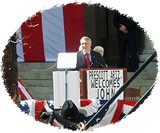 had
used the courthouse steps, here in the territorial capital of
Prescott, to announce his Senate bids and his entry into the 1964
Presidential race.
McCain has followed suit for his campaigns, so this venue is becoming
quite a tradition. Arizona's junior senator, Jon Kyl (photo at
right), provided the introductions. McCain was also accompanied
by his wife, Cindy, who also spoke to the crowd. had
used the courthouse steps, here in the territorial capital of
Prescott, to announce his Senate bids and his entry into the 1964
Presidential race.
McCain has followed suit for his campaigns, so this venue is becoming
quite a tradition. Arizona's junior senator, Jon Kyl (photo at
right), provided the introductions. McCain was also accompanied
by his wife, Cindy, who also spoke to the crowd.
The courthouse block was packed, but there was space to wend through
the crowd and there was still viewing space near the street. We
arrived right at 10 a.m., which was the advertised start time for the
speech. It didn't really get going until about twenty minutes
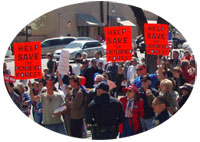 after
the hour. The crowd was supportive, but not fanatical.
There were some Obama supporters walking around
with
signs, but not being disruptive. There were some other groups of
protestors - Ron Paul supporters, anti-war groups and even a group
protesting to "Help Save the Petrified Forest," pictured to
the left. I've never heard of this cause - maybe it was a late
April Fools joke? The Petrified
Forest National Park is only about seventy miles from where I
live, and I haven't heard of any preservation issues. Then,
again, maybe they were referring to the old movie,
starring Humphrey Bogart. after
the hour. The crowd was supportive, but not fanatical.
There were some Obama supporters walking around
with
signs, but not being disruptive. There were some other groups of
protestors - Ron Paul supporters, anti-war groups and even a group
protesting to "Help Save the Petrified Forest," pictured to
the left. I've never heard of this cause - maybe it was a late
April Fools joke? The Petrified
Forest National Park is only about seventy miles from where I
live, and I haven't heard of any preservation issues. Then,
again, maybe they were referring to the old movie,
starring Humphrey Bogart.
McCain's speech seemed to be a one-of-a-kind affair. He talked
at great length of Barry Goldwater and Mo Udall, both giants of
Arizona politics and both unsuccessful candidates for president, both
friends of each other and both from different parties. McCain
was really flying his bi-partisan colors today and probably will be
quite successful at winning over a lot of independents, even with the
contentiousness about the war.
After the speech, John and Cindy shook hands along the crowded line of
supporters. We got pretty close, but decided to head around the
back side of the courthouse to snap a few photos as the couple neared
the Straight Talk
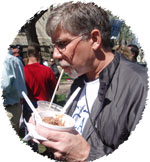 Express.
Well, we really lucked out here. There weren't many people over
here, and when the McCains rounded the bus,
they headed over to shake hands. I was able to wedge myself into
a spot where I could lean over and got to shake hands with both.
Any photos you might ask? Well, no, because I was holding the
camera! So it goes. Express.
Well, we really lucked out here. There weren't many people over
here, and when the McCains rounded the bus,
they headed over to shake hands. I was able to wedge myself into
a spot where I could lean over and got to shake hands with both.
Any photos you might ask? Well, no, because I was holding the
camera! So it goes.
After they boarded the bus, Cara Lynn and I headed across the street
to get some ice cream at Kendall's.
That hit the spot. The weather was pleasantly warm, and, during
the speech, the winds were calm. We wandered back to the bus,
where some TV interviews were going on, and stuck around until they
drove off. We had a nice spot standing on top of some kind of a
storage bin, from where we could survey all the goings-on in the
area. We also were well-positioned to wave to Cindy McCain, who
was standing alongside the driver as the bus pulled out of the
driveway.
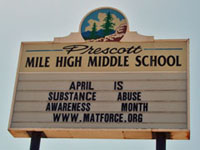  In Prescott,
students get mixed messages.
While the
street parking for the McCain event was tight, we were able to easily
get a spot on the top deck of a parking garage just a couple of blocks
from the courthouse. From this vantage point we could see all
around the city. We could even make out the tops of the San
Francisco Peaks, which serve as the backdrop to our home in
Flagstaff. We watched as an Arizona DPS helicopter landed, and
then took off, from a middle school just a couple of blocks
away. I just had to get a picture of the school's sign
here. Do you think that the students at the "Mile
High" middle school would be able to notice that it was
"substance abuse awareness month?" Makes you wonder.
In Prescott,
students get mixed messages.
While the
street parking for the McCain event was tight, we were able to easily
get a spot on the top deck of a parking garage just a couple of blocks
from the courthouse. From this vantage point we could see all
around the city. We could even make out the tops of the San
Francisco Peaks, which serve as the backdrop to our home in
Flagstaff. We watched as an Arizona DPS helicopter landed, and
then took off, from a middle school just a couple of blocks
away. I just had to get a picture of the school's sign
here. Do you think that the students at the "Mile
High" middle school would be able to notice that it was
"substance abuse awareness month?" Makes you wonder.
|
|

|
|
Thursday,
April 10, 2008
 Sky
High Subsidies Unnecessary
- The
city council wants there to be more daily flights from our local
airport, into which we have poured millions of dollars to spruce
up and which the Feds have spent millions on runway
improvements. Probably not the best use of public funds, but its
a done deal. But, it gets worse. To "promote"
competition, the city has been willing to pay up to a million dollars
to guarantee passenger loads in order to attract another
airline. Alas, does anybody understand the principle of
competition? It seems not. So, time to speculate about
what a truly free market would look like. The
editorial ran on March 9. Sky
High Subsidies Unnecessary
- The
city council wants there to be more daily flights from our local
airport, into which we have poured millions of dollars to spruce
up and which the Feds have spent millions on runway
improvements. Probably not the best use of public funds, but its
a done deal. But, it gets worse. To "promote"
competition, the city has been willing to pay up to a million dollars
to guarantee passenger loads in order to attract another
airline. Alas, does anybody understand the principle of
competition? It seems not. So, time to speculate about
what a truly free market would look like. The
editorial ran on March 9.
|
 Editorial
Board Sounding: Privatize Pulliam Airport and let the
free market work Editorial
Board Sounding: Privatize Pulliam Airport and let the
free market work
Although
there are a myriad of rules that apply to government airports,
what if Pulliam were privatized and competitively operated . .
. ?
A traveler
arrives at the airport to find plenty of parking, thanks to
the new J.W. Powell Parking Garage. Built in less time
than it takes to have a second reading on parking meters, it
provides wintertime travelers great shelter. Or, park in
one of the private surface lots, and save a few bucks.
Once in
the terminal you can check in at a computer kiosk, or with a
“flight agent.” They can help you with a reservation
on any one of the twenty flights scheduled for today, like the
Southwest flight to El Paso, or the Continental flight to
Denver. And, don’t forget that a new start-up airline
has a noon flight to John Wayne Airport out in California.
Flights
change daily. Airlines don’t need to contract to
provide a specific level of service for a specific period of
time. All they do is bid on landing and take-off
windows. Airlines publish schedules about a week in
advance, although some schedule particular flights up to six
months in advance. Some airlines have come, and gone.
Some successful travel destinations have been a surprise, like
the twice monthly flight to Lincoln, Nebraska.
Instead of
using taxpayer money to pay for airline service, let’s use
this opportunity to let the vibrant, creative and dynamic
forces of the free market work their magic. No, we
can’t? Yes, we can!
Dennis
Foster has a Ph.D. in economics, teaches at the university
level and is an avid Grand Canyon hiker. |
Shortly after this, the council agreed to put up $600,000 to get
Horizon Air to sign on for two (yes, 2!) daily flights to Los
Angeles. So far, Horizon plans to have one of these flights stop
in Prescott, lengthening the flight time. And, these flights
will be turboprops, not jets, which was the whole point of the runway
extension to begin with. The problem, of course, is that the
city wants the airline to sign a long-term commitment, which deters
true competition here.
Another
interesting aspect here is that the presumed purpose of this new
service will be to promote business growth in Flagstaff. That
is, if there is regular service to L.A., as well as to Phoenix (the
existing service), then new firms may be more easily enticed into
locating here. Not only does that seem absurd, but now there's
proof positive - Horizon is now touting this service as "Flagstaff/Grand
Canyon," meaning that they will be catering to the tourist
market, not to business travelers. Who'd thunk it?
Certainly, nobody at City Hall!
Finally,
I decided to embrace Barack Obama's rhetoric by closing with his
oft-used refrain of "Yes, we can!"
|
|

|
|
Saturday,
April 12, 2008
 Guns
and Schools
- Someone
at the state legislature has been kicking around the idea of allowing
guns in restaurants and in schools. The usual hue and cry erupts
in opposition, implying that people will be shooting up these
places! How bizarre can you get? Indeed, one of my
compatriots on the editorial board wrote a dissenting opinion on this
topic and included the suggestion that two year olds would be carrying
guns. The editorial
ran on March 16. Guns
and Schools
- Someone
at the state legislature has been kicking around the idea of allowing
guns in restaurants and in schools. The usual hue and cry erupts
in opposition, implying that people will be shooting up these
places! How bizarre can you get? Indeed, one of my
compatriots on the editorial board wrote a dissenting opinion on this
topic and included the suggestion that two year olds would be carrying
guns. The editorial
ran on March 16.
|
 Editorial
Board Sounding: No magic wand will make schools safe Editorial
Board Sounding: No magic wand will make schools safe
“What if
… ?” That seems to be the major argument against
allowing citizens to legally carry weapons in public places,
especially in schools. This argument is rooted in the
“magic wand” theory of public policy – with a simple
wave we can declare schools “gun-free” zones, and these
places will be safe. Of course, reality is quite
different. Our current law really means that only
homicidal maniacs may carry weapons into a school. In
the world I live in, incentives matter, and this law does not
create the right kind of incentives. [Yes, even
homicidal maniacs respond to incentives.] Those that are
pushing to allow guns in schools are at least trying to change
this incentive structure so that students, faculty and staff
are not subject to this perverse consequence of the magic
wand.
Still,
there might be some middle ground here. How about
allowing only holders of CCW permits to be so armed in public
venues, when such venues don’t otherwise screen for weapons?
Perhaps the requirements for the CCW permit can even be raised
a notch or two as well – for example, some proficiency
requirements and biannual renewal classes to keep up with
legal issues.
Another idea is to keep the gun
ban in place, but to require the installation of non-lethal
devices, like tasers, throughout a facility, as is done with
fire alarms, and with increasing frequency, defibrillators.
This certainly would go a long way to creating the right
incentives without arousing all the “what if" arguments.
Dennis
Foster has a Ph.D. in economics, teaches at the university
level, is an avid Grand Canyon hiker and doesn’t own a
gun, but knows people who do. |
I try to use this platform to not only criticize, but also to make
suggestions. While it may seem more than a bit off the wall to
argue for installing tasers
like they were fire alarms, I rather like the idea. In keeping
to the word limit, I had to drop a line I really liked about the
homicidal maniacs responding to incentives - "that's why they
attack schools instead of motorcycle rallies." See, they
are rational. Just go ask Nobel-prize winning economist Gary
Becker.
|
|

|
|
Sunday,
April 20, 2008
 The
Dirty Dozen
- Such
is the title of a new book by Robert Levy and William Mellor.
[The image to the right is linked to the Amazon web page.] It is
the story of the The
Dirty Dozen
- Such
is the title of a new book by Robert Levy and William Mellor.
[The image to the right is linked to the Amazon web page.] It is
the story of the
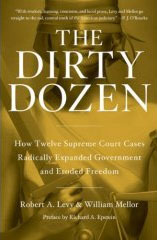 "worst"
twelve Supreme Court decisions in the modern era, meaning since about
the Great Depression. Yes, way too many would otherwise come
from the first hundred years! Author Robert Levy was featured at
the Goldwater Institute
this past week as part of their "Who's Writing Now?" series,
which Cara Lynn and I were fortunate enough to be able to attend this
past Thursday. "worst"
twelve Supreme Court decisions in the modern era, meaning since about
the Great Depression. Yes, way too many would otherwise come
from the first hundred years! Author Robert Levy was featured at
the Goldwater Institute
this past week as part of their "Who's Writing Now?" series,
which Cara Lynn and I were fortunate enough to be able to attend this
past Thursday.
Levy gave a fascinating talk to the crowd of one hundred, or so, out
on the patio behind the institute building. He pursued a law
degree in his mid-40s after having been a successful
entrepreneur. He clerked for Clint Bolick, who is currently the
director of the Scharf-Norton Center for Constitutional Litigation at
Goldwater. Bolick said that Levy, now a senior fellow at Cato, was
the most unusual law clerk they ever had - during his lunch
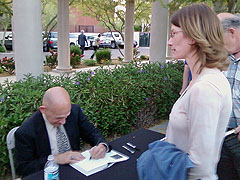 breaks
at the firm, he would be on the phone to his broker buying and selling
stock! And, apparently, doing quite well for himself. In
fact, the firm not only offered Levy a job, but put him on their board
of directors. breaks
at the firm, he would be on the phone to his broker buying and selling
stock! And, apparently, doing quite well for himself. In
fact, the firm not only offered Levy a job, but put him on their board
of directors.
Levy was a very engaging speaker and had the crowd listening in rapt
attention. The stories of these cases, chosen in part from a
survey he and his co-author conducted among other lawyers, were
fascinating, if brief for this venue. Still he talked to us for
close to an hour and took questions at the end. Afterwards, we
got a copy of his book (not available at stores until May 1), and Cara
Lynn got Levy to sign a copy for us.
The book is great. The chapters can be read in whatever order
you wish. I started with some of the more peculiar
economics-related cases - Wickard v. Filburn (Congress can pass a law
that you can't grow wheat for your own consumption because it interferes
with interstate commerce!); the Gold Clause Cases (where a building
owner in Des Moines had to keep the rent on his 143,000 square foot
office building fixed at $23,000 from 1933 to 1993 because the
government ended the gold standard!!); Whitman v. American Trucking
Associations, Inc. (Congress can defer its legislative abilities to
unelected bureaucracies - in this case the EPA - who can establish
rules, determine penalties and adjudicate guilt!!!).
Why is it that these cases are unfamiliar to me? I am reasonably
intelligent and well-read. I guess that they just didn't make it
into the educational curriculum at the schools I attended, probably
because they are so crucial to the foundation of the current
welfare/nanny state mentality that so infects the body politic.
Yes, we did cover the Dred Scott case, but that didn't make Levy and
Mellor's book because it was an old case, and, of course, since
overturned by constitutional amendment. And, there is another
thing. Someone asked Levy if the notion that the constitution is
a "living document" was legitimate. Absolutely not,
was Levy's response. That notion denigrates the value of the
constitution, making it meaningless. Times do change, and the
framers constructed a method by which we can amend the constitution to
reflect those changes. This has been done seventeen times.
Yet, we have been inculcated with the notion that the "living
constitution" is some kind of special gift, when, in fact, it is
a curse. Two thumbs up.
|
|

|
|
Tuesday,
April 29, 2008
 Iraq
War at Five
- The
previous editorial on guns
ran in the paper on
the weekend at the start of our spring break. I had planned to
be hiking in the Grand Canyon for some eight days, but was stymied by
the snow packed roads on the north rim. Consequently, I only
ended up doing a couple of days of cross-country skiing before
returning home. I did write up a story for the paper on this
mini-adventure, which they published under the title, "North
Rim Skiing Likely to Last." The bottom line here is
that I was home during most of the spring break and had the
opportunity to get another editorial in the paper for the following
weekend. The Iraq War had just "turned" five years old
this week, and the paper ran an editorial
on the conflict, lamenting on the "futility of peace" and
arguing that it is time to go. Well, we didn't have an editorial
board meeting this week, so this was not a topic of discussion among
the group. And, I thought that the tenor of the editorial was
totally wrong. So, I decided to pen a counter; my
editorial
ran on March 23. Iraq
War at Five
- The
previous editorial on guns
ran in the paper on
the weekend at the start of our spring break. I had planned to
be hiking in the Grand Canyon for some eight days, but was stymied by
the snow packed roads on the north rim. Consequently, I only
ended up doing a couple of days of cross-country skiing before
returning home. I did write up a story for the paper on this
mini-adventure, which they published under the title, "North
Rim Skiing Likely to Last." The bottom line here is
that I was home during most of the spring break and had the
opportunity to get another editorial in the paper for the following
weekend. The Iraq War had just "turned" five years old
this week, and the paper ran an editorial
on the conflict, lamenting on the "futility of peace" and
arguing that it is time to go. Well, we didn't have an editorial
board meeting this week, so this was not a topic of discussion among
the group. And, I thought that the tenor of the editorial was
totally wrong. So, I decided to pen a counter; my
editorial
ran on March 23.
|
 Editorial
Board Sounding: Future Peace Worth the Sacrifices Editorial
Board Sounding: Future Peace Worth the Sacrifices
As General
Sherman noted, “War is Hell.” And, so it is.
Brutal, bloody, rife with paradox. What is interesting
about the American experience with war is that we don’t
fight for the expansion of our territory, our acquisition of
Guam notwithstanding. While we are not, and should not
be, the world’s policeman, we have come to accept that our
might, and our blood, can be used to help make the world a
better place. We fought against Germany and Japan, and
turned to rehabilitate them, not subsume them. Is not
the world better off as a consequence? Of course it is,
and we take it for granted.
In Korea,
can there be a starker contrast between the north and south?
Would the world have been better off if we had consigned the
millions of South Koreans to the cruel fate of their northern
kinsmen, surviving under the pathological two Kims?
South Korea didn’t become an instant and vibrant democracy.
Far from it. But, they have evolved into a nation that
would be considered a role model for Iraq.
Conversely,
in Vietnam we lost sight of our objectives, and with the
myopic nature of politics, cut a bad deal to end the war
“with honor.” Soon thereafter, we were watching on
as the horror of the killing fields enveloped neighboring
Cambodia.
Yes, Iraq
is a mess. But, a generation, or two, from now, perhaps
the world will recognize the value of the sacrifices made.
Or, perhaps they’ll just take it for granted.
Dennis Foster has a Ph.D. in
economics, teaches at the university level, is an avid Grand
Canyon hiker and encourages contributions to www.soldiersangels.com. |
I think the
main point is pretty straightforward - we should contemplate the
notion that this is going to be harder than we thought, but that is
the nature of war and peace. I was going to include the fact
that casualties during five years in Iraq still are less than an
hour along the Bloody Road at Antietam. Perspective is
everything. And, since we no longer have a military draft,
those soldiers that do enlist know that they may face some danger.
Some weeks later this topic did come up in our editorial board
meeting. Although some argued that it was obvious that we've
failed in Iraq and should leave, I remarked that the "boots on
the ground" - the men and women doing the heavy lifting over
there - are supportive of their efforts to bring some sanity to this
region. Despite the price tag, which is a different issue, the
views of our soldiers should carry some weight in these discussion,
but often aren't.
There was some blowback from my letter, and a counter letter
by Marcus Ford. We have clashed before, and will certainly do so
again. But, his point seems to be that America is better defined
by its conflict with the Spanish and the Indians than it is by our
conflict with Germany and Japan. Too bizarre.
|
|

|

|

|

|

|